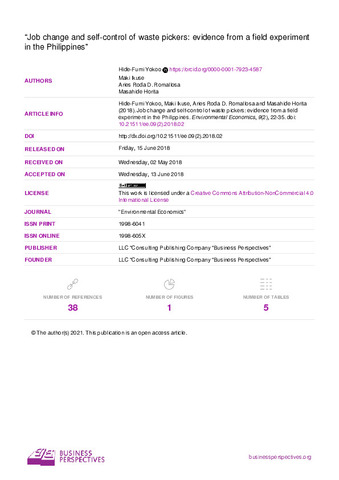Ipakita ang simpleng tala ng item
Job change and self-control of waste pickers: Evidence from a field experiment in the Philippines
| dc.contributor.author | Yokoo, Hide-Fumi | |
| dc.contributor.author | Ikuse, Maki | |
| dc.contributor.author | Romallosa, Aries Roda D. | |
| dc.contributor.author | Horita, Masahide | |
| dc.date.accessioned | 2021-11-23T00:32:26Z | |
| dc.date.available | 2021-11-23T00:32:26Z | |
| dc.date.issued | 2018-06-15 | |
| dc.identifier.citation | Yokoo, H. F. , Ikuse, M. , Romallosa, A. R. D. & Horita, M. (2018). Job change and self-control of waste pickers: Evidence from a field experiment in the Philippines. Environmental Economics, 9(2), 22-35. doi:10.21511/ee.09(2).2018.02 | en_US |
| dc.identifier.issn | 1998-6041 | |
| dc.identifier.issn | 1998-605X | |
| dc.identifier.uri | https://hdl.handle.net/20.500.12852/1705 | |
| dc.description | Journal article | en_US |
| dc.description.abstract | Environmental policies may have a negative side effect on employment, often in a specific industry in the short run. Workers in regulated industries can be affected by losses in job-specific human capital. The informal sectors in developing countries are often associated with environmental pollution and thus targeted by such policies. Welfare loss due to this side effect can be problematic in developing countries, since they often lack safeguarding schemes, including unemployment insurance. Inducing workers in informal sectors to change their jobs can mitigate these negative side effects. This study examines efficient methods of inducing informal workers to change jobs. An alternative job is offered to informal workers at a dumpsite in the Philippines and whether changing the scheme of wage payment increases the acceptance of the offer is examined. The impacts of changing payment schemes are evaluated by using a randomized field experiment. The sampled 112 waste pickers each randomly receive one of four offers for an alternative job, and the number of those who accept the offer is observed to evaluate the impact of less frequent payment (i.e., once every three days instead of daily). Piece rates and fixed wages are also compared. Those offered less frequent payment are more likely to accept the job offer compared with those offered daily payment. This preferred payment scheme can mitigate the side effects of environmental policy and workers’ self-control problem related to savings, while minimizing moral hazard. | en_US |
| dc.description.sponsorship | Grant for Environmental Research Projects from the Sumitomo Foundation and JSPS Grant-in-Aid for Scientific Research on Innovative Areas 25101003 | en_US |
| dc.language.iso | en | en_US |
| dc.publisher | Business Perspectives | en_US |
| dc.relation.uri | https://www.businessperspectives.org/images/pdf/applications/publishing/templates/article/assets/10451/EE_2018_02_Yokoo.pdf#page=2 | en_US |
| dc.subject.lcsh | Ragpickers | en_US |
| dc.subject.lcsh | Job offers | en_US |
| dc.subject.lcsh | Wage payment systems | en_US |
| dc.subject.lcsh | Self-control | en_US |
| dc.subject.lcsh | Ragpickers--Economic conditions | en_US |
| dc.subject.lcsh | Ragpickers--Employment | en_US |
| dc.subject.lcsh | Informal sector (Economics) | en_US |
| dc.subject.lcsh | Philippines | en_US |
| dc.title | Job change and self-control of waste pickers: Evidence from a field experiment in the Philippines | en_US |
| dc.type | Article | en_US |
| dc.citation.firstpage | 22 | en_US |
| dc.citation.lastpage | 35 | en_US |
| dc.citation.journaltitle | Environmental Economics | en_US |
| dc.citation.volume | 9 | en_US |
| dc.citation.issue | 2 | en_US |
| local.subject | Field experiment | en_US |
| local.subject | Job change | en_US |
| local.subject | Payment schemes | en_US |
| local.subject | Side effect of an environmental policy | en_US |
| local.subject | Waste management | en_US |
| local.subject | Waste pickers | en_US |
| dc.identifier.doi | 10.21511/ee.09(2).2018.02 |
Mga file sa item na ito
Lumilitaw ang item na ito sa mga sumusunod na (mga) Koleksyon
-
Journal articles [6]


